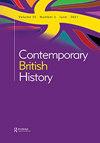It’s your world too, you can do what you want”: the role of subcultural activism in Stop The City protests (1983-1984) and its implications for political protest in Britain’
IF 0.5
2区 历史学
Q1 HISTORY
引用次数: 0
Abstract
ABSTRACT This article explores the role of subcultural activism in the Stop the City Protests (STC), 1983-1984. It shows how protestors broke with the consensual approach of overarching political organisations, chiefly the Campaign for Nuclear Disarmament (CND), using direct action tactics to shut down the City of London, which was emerging as a strategic centre for globalised capitalism. STC is shown to be on a continuum with the radicalism of the preceding decades, with bands, including Crass and Poison Girls bridging the gap to anarcho-punk. This article innovates by combining official evidence, in the form of police briefing notes, with ‘ground-up’ activist materials and fanzines, to evaluate the approach and ideology of the protestors and the police, thereby tracing the increasingly intolerant policing methods that were adopted during key political battles of the 1980s, including The Miners’ Strike and The Battle of the Beanfield. Questioning the extent to which Thatcherism was the hegemonic project of the 1980s, it demonstrates how STC was at odds with the contemporaneous corporatisation of political activism, and thereby provided a model for the road protests and Reclaim the Streets movement of the 1990s, and fed into the anti-globalisation and environmental movements of the 21st century.这也是你的世界,你可以做你想做的事”:亚文化激进主义在“停止城市抗议”(1983-1984)中的作用及其对英国政治抗议的影响
本文探讨了亚文化行动主义在1983-1984年“停止城市抗议”(Stop the City Protests, STC)中的作用。它展示了抗议者是如何打破了主要是核裁军运动(CND)的政治组织的共识,使用直接行动策略关闭了伦敦金融城,而伦敦金融城正逐渐成为全球化资本主义的战略中心。STC被证明与前几十年的激进主义是一个连续体,包括克拉斯和毒药女孩在内的乐队弥合了与无政府朋克的差距。本文的创新之处是将官方证据(以警察简报的形式)与“彻底的”激进分子材料和杂志相结合,以评估抗议者和警察的方法和意识形态,从而追溯20世纪80年代关键政治斗争中采用的日益不宽容的警务方法,包括矿工罢工和豆田之战。质疑撒切尔主义在多大程度上是20世纪80年代的霸权项目,它展示了STC如何与同时代的政治激进主义公司化相矛盾,从而为20世纪90年代的道路抗议和“收复街道”运动提供了一个模式,并融入了21世纪的反全球化和环境运动。
本文章由计算机程序翻译,如有差异,请以英文原文为准。
求助全文
约1分钟内获得全文
求助全文
来源期刊

Contemporary British History
HISTORY-
CiteScore
1.40
自引率
14.30%
发文量
34
期刊介绍:
Contemporary British History offers innovative new research on any aspect of British history - foreign, Commonwealth, political, social, cultural or economic - dealing with the period since the First World War. The editors welcome work which involves cross-disciplinary insights, as the journal seeks to reflect the work of all those interested in the recent past in Britain, whatever their subject specialism. Work which places contemporary Britain within a comparative (whether historical or international) context is also encouraged. In addition to articles, the journal regularly features interviews and profiles, archive reports, and a substantial review section.
 求助内容:
求助内容: 应助结果提醒方式:
应助结果提醒方式:


